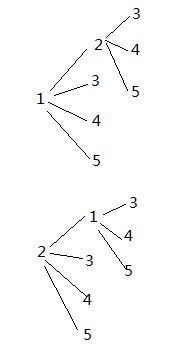- 48. 旋转图像 - 力扣(LeetCode)
Fiee-77
#数组leetcode算法python数据结构数组
题目:给定一个n×n的二维矩阵matrix表示一个图像。请你将图像顺时针旋转90度。你必须在原地旋转图像,这意味着你需要直接修改输入的二维矩阵。请不要使用另一个矩阵来旋转图像。示例1:输入:matrix=[[1,2,3],[4,5,6],[7,8,9]]输出:[[7,4,1],[8,5,2],[9,6,3]]示例2:输入:matrix=[[5,1,9,11],[2,4,8,10],[13,3,6,
- 图论算法经典题目解析:DFS、BFS与拓扑排序实战
周童學
数据结构与算法深度优先算法图论
图论算法经典题目解析:DFS、BFS与拓扑排序实战图论问题是算法面试中的高频考点,本博客将通过四道LeetCode经典题目(均来自"Top100Liked"题库),深入讲解图论的核心算法思想和实现技巧。涵盖DFS、BFS、拓扑排序和前缀树等知识点,每道题配有Java实现和易错点分析。1.岛屿数量(DFS遍历)问题描述给定一个由'1'(陆地)和'0'(水)组成的二维网格,计算岛屿的数量。岛屿由水平或
- 867. 转置矩阵--leetcode
黄油烤菠萝
算法数据结构leetcodejava
867.转置矩阵简单提示给你一个二维整数数组matrix,返回matrix的转置矩阵。矩阵的转置是指将矩阵的主对角线翻转,交换矩阵的行索引与列索引。示例1:输入:matrix=[[1,2,3],[4,5,6],[7,8,9]]输出:[[1,4,7],[2,5,8],[3,6,9]]示例2:输入:matrix=[[1,2,3],[4,5,6]]输出:[[1,4],[2,5],[3,6]]提示:m==
- 关于leetcode第56题合并重复区间的解析
冬天里的懒喵
[toc]1.题目描述给出一个区间的集合,请合并所有重叠的区间。示例1:输入:[[1,3],[2,6],[8,10],[15,18]]输出:[[1,6],[8,10],[15,18]]解释:区间[1,3]和[2,6]重叠,将它们合并为[1,6].示例2:输入:[[1,4],[4,5]]输出:[[1,5]]解释:区间[1,4]和[4,5]可被视为重叠区间。https://leetcode-cn.co
- Leetcode 热题100道刷题
Not--found
leetcode算法
哈希算法哈希表(HashTable)是一种根据关键字直接访问内存存储位置的数据结构。通过哈希表,数据元素的存放位置和数据元素的关键字之间建立起某种对应关系,建立这种对应关系的函数称为哈希函数。1.两数之和(Leetcode1)给定一个整数数组nums和一个整数目标值target,请你在该数组中找出和为目标值target的那两个整数,并返回它们的数组下标。你可以假设每种输入只会对应一个答案。但是,数
- LeetCode热题100:哈希
Intro_Nitro
LeetCode热题100哈希算法leetcode
1.两数之和题目链接:两数之和题目描述:给定一个整数数组nums和一个整数目标值target,请你在该数组中找出和为目标值target的那两个整数,并返回它们的数组下标。你可以假设每种输入只会对应一个答案。但是,数组中同一个元素在答案里不能重复出现。你可以按任意顺序返回答案。解题思路:我们创建一个哈希表,以数组的值做key,索引做value。对于每一个x,我们首先查询哈希表中是否存在target-
- C++算法之单调栈
ぼっち・ざ・ろっく!-後藤一里|ポチ
C++算法c++java开发语言
C++算法中的单调栈:从入门到实战指南大家好!今天我们来聊聊C++算法中一个超级实用的工具——单调栈。别被名字吓到,它其实很简单,就像排队买奶茶一样:队伍总是从矮到高(或从高到矮)排得整整齐齐,这样处理问题时就特别高效。在算法面试里,单调栈是高频考点,LeetCode上很多难题(比如找“下一个更大元素”或算“柱状图最大面积”)都能用它轻松搞定。这篇文章,我会用接地气的语言,带大家一步步理解单调栈的
- [LeetCode 169/229] Majority Element I/II (easy / medium)
灰睛眼蓝
LeetCode169IGivenanarrayofsizen,findthemajorityelement.Themajorityelementistheelementthatappearsmorethan⌊n/2⌋times.Youmayassumethatthearrayisnon-emptyandthemajorityelementalwaysexistinthearray.Example
- [leetcode]355. Design Twitter
大米GoGoGo
leetcode数据结构leetcodedesign
题目链接:https://leetcode.com/problems/design-twitter/题意:这是一个设计类题目,本题要求设计一个Twitter,主要支持以下几种操作:发表一条状态postTweet(userId,tweetId)关注某个用户follow(followerId,followeeId):Followerfollowsafollowee对某个用户取消关注unfollow(f
- 【LeetCode】算法详解#8 ---螺旋矩阵
Fanxt_Ja
算法算法leetcode矩阵java辅助空间
1.题目介绍给定一个m行n列的矩阵matrix,请按照顺时针螺旋顺序,返回矩阵中的所有元素。提示:m==matrix.lengthn==matrix[i].length1spiralOrder(int[][]matrix){intm=matrix.length;intn=matrix[0].length;//定义临时数组记录访问位置int[][]temp=newint[matrix.length]
- Leetcode力扣解题记录--第136题(查找单数)
不愧是你呀
Leetcodeleetcode算法数据结构
题目链接:136.只出现一次的数字-力扣(LeetCode)题目描述给你一个非空整数数组nums,除了某个元素只出现一次以外,其余每个元素均出现两次。找出那个只出现了一次的元素。你必须设计并实现线性时间复杂度的算法来解决此问题,且该算法只使用常量额外空间。示例1:输入:nums=[2,2,1]输出:1示例2:输入:nums=[4,1,2,1,2]输出:4示例3:输入:nums=[1]输出:1题目作
- leetcode--334--递增的三元子序列
minningl
题目:给定一个未排序的数组,判断这个数组中是否存在长度为3的递增子序列。数学表达式如下:如果存在这样的i,j,k,且满足0≤i&nums){intfirst=INT_MAX;intsecond=INT_MAX;for(intnum:nums){if(num<=first){first=num;}elseif(num<=second){second=num;}else{returntrue;}}re
- LeetCode|Day26|191. 位 1 的个数|Python刷题笔记
Norvyn_7
leetcode刷题leetcodepython笔记
LeetCode|Day26|191.位1的个数|Python刷题笔记️本文属于【LeetCode简单题百日计划】系列点击查看系列总目录>>题目简介题号:191.位1的个数难度:简单题目链接:点击跳转题目描述编写一个函数,接收一个无符号整数n,返回其二进制表示中"1"的个数。这个问题通常被称为HammingWeight(汉明重量)。示例1:输入:n=11(二进制为00000000000000000
- LeetCode|Day19|14. 最长公共前缀|Python刷题笔记
Norvyn_7
leetcode刷题leetcodepython笔记
LeetCode|Day19|14.最长公共前缀|Python刷题笔记️本文属于【LeetCode简单题百日计划】系列点击查看系列总目录>>题目简介题号:14.最长公共前缀难度:简单题目链接:点击跳转题目描述(简要)编写一个函数来查找字符串数组中的最长公共前缀。如果不存在公共前缀,返回空字符串""。示例:输入:strs=["flower","flow","flight"]输出:"fl"输入:str
- LeetCode|Day10|917. 仅仅反转字母|Python刷题笔记
Norvyn_7
leetcode刷题leetcodepython笔记
LeetCode|Day10|917.仅仅反转字母|Python刷题笔记️本文属于【LeetCode简单题百日计划】系列点击查看系列总目录>>题目简介题号:917.仅仅反转字母难度:简单题目链接:点击跳转题目描述(简要)给你一个字符串s,仅反转其中的字母字符,非字母字符保持原地不动。示例:输入:s="a-bC-dEf-ghIj"输出:"j-Ih-gfE-dCba"解法:双指针法classSolut
- LeetCode|Day15|125. 验证回文串|Python刷题笔记
Norvyn_7
leetcode刷题leetcodepython笔记
LeetCode|Day15|125.验证回文串|Python刷题笔记️本文属于【LeetCode简单题百日计划】系列点击查看系列总目录>>题目简介题号:125.验证回文串难度:简单题目链接:点击跳转题目描述(简要)给定一个字符串s,判断它是否是回文串,仅考虑字母和数字字符,并忽略大小写。示例:输入:s="Aman,aplan,acanal:Panama"输出:true解释:"amanaplana
- LeetCode|Day18|20. 有效的括号|Python刷题笔记
Norvyn_7
leetcode刷题leetcodepython笔记
LeetCode|Day18|20.有效的括号|Python刷题笔记️本文属于【LeetCode简单题百日计划】系列点击查看系列总目录>>题目简介题号:20.有效的括号难度:简单题目链接:点击跳转题目描述(简要)判断一个字符串中的括号是否有效。括号包括()[]{}左右匹配;顺序也必须正确;空字符串是有效括号。示例:输入:s="()[]{}"输出:true输入:s="(]"输出:false解法:栈+
- leetcode0954. 二倍数对数组-medium
智趣代码实验室
Leetcode算法c++leetcode数据结构
1题目:二倍数对数组官方标定难度:中给定一个长度为偶数的整数数组arr,只有对arr进行重组后可以满足“对于每个0&arr){std::sort(arr.begin(),arr.end(),[](inta,intb){returnabs(a)>abs(b);});unordered_mapl;for(inti:arr){if(l[i*2]){l[i*2]--;}else{l[i]++;}}for(
- [LeetCode 376] 摆动序列
来到了没有知识的荒原
376.摆动序列方法0出自评论区这位大佬,真的tql%%%思路其实和下面方法4的状态自动机差不多,但代码就是简洁很多。classSolution{public:intwiggleMaxLength(vector&nums){intn=nums.size();if(nnums[i-1]){up=down+1;}if(nums[i]&nums){if(nums.size()nums[i]){STATE
- LeetCode 852:山脉数组的峰顶索引解析与实现
LeetCode852:山脉数组的峰顶索引解析与实现题目描述给定一个长度为n的整数山脉数组arr,其中的值先递增到一个峰值元素,然后递减。要求返回峰值元素的下标。题目要求必须设计并实现时间复杂度为O(log(n))的解决方案。示例示例1:输入:arr=[0,1,0]输出:1示例2:输入:arr=[0,2,1,0]输出:1示例3:输入:arr=[0,10,5,2]输出:1提示3arr[i+1]峰值元
- 差分数组巧解拼车难题
lbflyo
数据结构
力扣1094https://leetcode.cn/problems/car-pooling/车上最初有capacity个空座位。车只能向一个方向行驶(也就是说,不允许掉头或改变方向)给定整数capacity和一个数组trips,trip[i]=[numPassengersi,fromi,toi]表示第i次旅行有numPassengersi乘客,接他们和放他们的位置分别是fromi和toi。这些位
- leetcode--1189--“气球” 的最大数量
minningl
题目:给你一个字符串text,你需要使用text中的字母来拼凑尽可能多的单词"balloon"(气球)。字符串text中的每个字母最多只能被使用一次。请你返回最多可以拼凑出多少个单词"balloon"。示例1:输入:text="nlaebolko"输出:1示例2:输入:text="loonbalxballpoon"输出:2示例3:输入:text="leetcode"输出:0提示:1dt={{'b'
- LeetCode - 字符串解码(栈数据结构/递归法)/ 接雨水(重复遍历/双指针法)
葵续浅笑
算法leetcode
欢迎光临小站:致橡树字符串解码给定一个经过编码的字符串,返回它解码后的字符串。编码规则为:k[encoded_string],表示其中方括号内部的encoded_string正好重复k次。注意k保证为正整数。你可以认为输入字符串总是有效的;输入字符串中没有额外的空格,且输入的方括号总是符合格式要求的。此外,你可以认为原始数据不包含数字,所有的数字只表示重复的次数k,例如不会出现像3a或2[4]的输
- LeetCode 391:完美矩形
生当鼎食死封侯
算法leetcode算法职场和发展
LeetCode391:完美矩形问题本质:精确覆盖的两个核心条件给定若干轴对齐的小矩形,判断它们是否能恰好覆盖一个大矩形(无重叠、无间隙)。需满足:面积守恒:所有小矩形的面积和等于大矩形的面积。顶点唯一:除大矩形的4个顶点外,其他顶点必须出现偶数次(重叠时顶点会被覆盖两次,间隙则会导致顶点缺失)。核心思路:面积+顶点统计1.面积校验遍历所有小矩形,计算大矩形的边界(最小左边界left、最小下边界b
- 代码随想录算法训练营第三十八天
写个博客
代码随想录打卡算法
LeetCode题目:1143.最长公共子序列1035.不相交的线53.最大子数组和392.判断子序列2094.找出3位偶数(每日一题)其他:今日总结往期打卡1143.最长公共子序列跳转:1143.最长公共子序列学习:代码随想录公开讲解问题:给定两个字符串text1和text2,返回这两个字符串的最长公共子序列的长度。如果不存在公共子序列,返回0。一个字符串的子序列是指这样一个新的字符串:它是由原
- 代码随想录算法训练营第二十七天
天天开心(∩_∩)
算法leetcode职场和发展
LeetCode.455分发饼干题目链接分发饼干题解classSolution{publicintfindContentChildren(int[]g,int[]s){intcount=0;Arrays.sort(g);Arrays.sort(s);for(inti=0;i=g[count]){count++;}}returncount;}}解题思路这段代码实现了"分发饼干"问题的解决方案,其核心
- LeetCode #535 Encode and Decode TinyURL TinyURL 的加密与解密
air_melt
535EncodeandDecodeTinyURLTinyURL的加密与解密Description:Note:ThisisacompanionproblemtotheSystemDesignproblem:DesignTinyURL.TinyURLisaURLshorteningservicewhereyouenteraURLsuchashttps://leetcode.com/problems/
- 组合问题(分割字符串)
limitless_peter
算法
131.分割回文串-力扣(LeetCode)classSolution{private:vector>result;vectorpath;voidbacktracking(string&s,intstartIndex){if(startIndex>=s.size()){result.push_back(path);return;}for(inti=startIndex;i>partition(st
- 代码随想录训练因第三十天| 39.组合总和 40.组合总和ll 131.分割回文串
焜昱错眩..
算法
39.组合总和:文档讲解:代码随想录|39.组合总和视频讲解:带你学透回溯算法-组合总和(对应「leetcode」力扣题目:39.组合总和)|回溯法精讲!_哔哩哔哩_bilibili状态:已做出思路:这道题目的关键点是给出的数组是无重复的元素,并且同一个数字能无限重复使用,那么使用回溯的话递归条件就按照题目要求,就是组合数的和等于目标值。题目并没有限制组合数个数,所以不用记录每次组合个数。设置三个
- 【LeetCode 热题 100】51. N 皇后——回溯
xumistore
LeetCodeleetcode算法职场和发展java
Problem:51.N皇后按照国际象棋的规则,皇后可以攻击与之处在同一行或同一列或同一斜线上的棋子。n皇后问题研究的是如何将n个皇后放置在n×n的棋盘上,并且使皇后彼此之间不能相互攻击。给你一个整数n,返回所有不同的n皇后问题的解决方案。每一种解法包含一个不同的n皇后问题的棋子放置方案,该方案中‘Q’和‘.’分别代表了皇后和空位。文章目录整体思路完整代码时空复杂度时间复杂度:O(N!)空间复杂度
- Java实现的基于模板的网页结构化信息精准抽取组件:HtmlExtractor
yangshangchuan
信息抽取HtmlExtractor精准抽取信息采集
HtmlExtractor是一个Java实现的基于模板的网页结构化信息精准抽取组件,本身并不包含爬虫功能,但可被爬虫或其他程序调用以便更精准地对网页结构化信息进行抽取。
HtmlExtractor是为大规模分布式环境设计的,采用主从架构,主节点负责维护抽取规则,从节点向主节点请求抽取规则,当抽取规则发生变化,主节点主动通知从节点,从而能实现抽取规则变化之后的实时动态生效。
如
- java编程思想 -- 多态
百合不是茶
java多态详解
一: 向上转型和向下转型
面向对象中的转型只会发生在有继承关系的子类和父类中(接口的实现也包括在这里)。父类:人 子类:男人向上转型: Person p = new Man() ; //向上转型不需要强制类型转化向下转型: Man man =
- [自动数据处理]稳扎稳打,逐步形成自有ADP系统体系
comsci
dp
对于国内的IT行业来讲,虽然我们已经有了"两弹一星",在局部领域形成了自己独有的技术特征,并初步摆脱了国外的控制...但是前面的路还很长....
首先是我们的自动数据处理系统还无法处理很多高级工程...中等规模的拓扑分析系统也没有完成,更加复杂的
- storm 自定义 日志文件
商人shang
stormclusterlogback
Storm中的日志级级别默认为INFO,并且,日志文件是根据worker号来进行区分的,这样,同一个log文件中的信息不一定是一个业务的,这样就会有以下两个需求出现:
1. 想要进行一些调试信息的输出
2. 调试信息或者业务日志信息想要输出到一些固定的文件中
不要怕,不要烦恼,其实Storm已经提供了这样的支持,可以通过自定义logback 下的 cluster.xml 来输
- Extjs3 SpringMVC使用 @RequestBody 标签问题记录
21jhf
springMVC使用 @RequestBody(required = false) UserVO userInfo
传递json对象数据,往往会出现http 415,400,500等错误,总结一下需要使用ajax提交json数据才行,ajax提交使用proxy,参数为jsonData,不能为params;另外,需要设置Content-type属性为json,代码如下:
(由于使用了父类aaa
- 一些排错方法
文强chu
方法
1、java.lang.IllegalStateException: Class invariant violation
at org.apache.log4j.LogManager.getLoggerRepository(LogManager.java:199)at org.apache.log4j.LogManager.getLogger(LogManager.java:228)
at o
- Swing中文件恢复我觉得很难
小桔子
swing
我那个草了!老大怎么回事,怎么做项目评估的?只会说相信你可以做的,试一下,有的是时间!
用java开发一个图文处理工具,类似word,任意位置插入、拖动、删除图片以及文本等。文本框、流程图等,数据保存数据库,其余可保存pdf格式。ok,姐姐千辛万苦,
- php 文件操作
aichenglong
PHP读取文件写入文件
1 写入文件
@$fp=fopen("$DOCUMENT_ROOT/order.txt", "ab");
if(!$fp){
echo "open file error" ;
exit;
}
$outputstring="date:"." \t tire:".$tire."
- MySQL的btree索引和hash索引的区别
AILIKES
数据结构mysql算法
Hash 索引结构的特殊性,其 检索效率非常高,索引的检索可以一次定位,不像B-Tree 索引需要从根节点到枝节点,最后才能访问到页节点这样多次的IO访问,所以 Hash 索引的查询效率要远高于 B-Tree 索引。
可能很多人又有疑问了,既然 Hash 索引的效率要比 B-Tree 高很多,为什么大家不都用 Hash 索引而还要使用 B-Tree 索引呢
- JAVA的抽象--- 接口 --实现
百合不是茶
抽象 接口 实现接口
//抽象 类 ,方法
//定义一个公共抽象的类 ,并在类中定义一个抽象的方法体
抽象的定义使用abstract
abstract class A 定义一个抽象类 例如:
//定义一个基类
public abstract class A{
//抽象类不能用来实例化,只能用来继承
//
- JS变量作用域实例
bijian1013
作用域
<script>
var scope='hello';
function a(){
console.log(scope); //undefined
var scope='world';
console.log(scope); //world
console.log(b);
- TDD实践(二)
bijian1013
javaTDD
实践题目:分解质因数
Step1:
单元测试:
package com.bijian.study.factor.test;
import java.util.Arrays;
import junit.framework.Assert;
import org.junit.Before;
import org.junit.Test;
import com.bijian.
- [MongoDB学习笔记一]MongoDB主从复制
bit1129
mongodb
MongoDB称为分布式数据库,主要原因是1.基于副本集的数据备份, 2.基于切片的数据扩容。副本集解决数据的读写性能问题,切片解决了MongoDB的数据扩容问题。
事实上,MongoDB提供了主从复制和副本复制两种备份方式,在MongoDB的主从复制和副本复制集群环境中,只有一台作为主服务器,另外一台或者多台服务器作为从服务器。 本文介绍MongoDB的主从复制模式,需要指明
- 【HBase五】Java API操作HBase
bit1129
hbase
import java.io.IOException;
import org.apache.hadoop.conf.Configuration;
import org.apache.hadoop.hbase.HBaseConfiguration;
import org.apache.hadoop.hbase.HColumnDescriptor;
import org.apache.ha
- python调用zabbix api接口实时展示数据
ronin47
zabbix api接口来进行展示。经过思考之后,计划获取如下内容: 1、 获得认证密钥 2、 获取zabbix所有的主机组 3、 获取单个组下的所有主机 4、 获取某个主机下的所有监控项
- jsp取得绝对路径
byalias
绝对路径
在JavaWeb开发中,常使用绝对路径的方式来引入JavaScript和CSS文件,这样可以避免因为目录变动导致引入文件找不到的情况,常用的做法如下:
一、使用${pageContext.request.contextPath}
代码” ${pageContext.request.contextPath}”的作用是取出部署的应用程序名,这样不管如何部署,所用路径都是正确的。
- Java定时任务调度:用ExecutorService取代Timer
bylijinnan
java
《Java并发编程实战》一书提到的用ExecutorService取代Java Timer有几个理由,我认为其中最重要的理由是:
如果TimerTask抛出未检查的异常,Timer将会产生无法预料的行为。Timer线程并不捕获异常,所以 TimerTask抛出的未检查的异常会终止timer线程。这种情况下,Timer也不会再重新恢复线程的执行了;它错误的认为整个Timer都被取消了。此时,已经被
- SQL 优化原则
chicony
sql
一、问题的提出
在应用系统开发初期,由于开发数据库数据比较少,对于查询SQL语句,复杂视图的的编写等体会不出SQL语句各种写法的性能优劣,但是如果将应用系统提交实际应用后,随着数据库中数据的增加,系统的响应速度就成为目前系统需要解决的最主要的问题之一。系统优化中一个很重要的方面就是SQL语句的优化。对于海量数据,劣质SQL语句和优质SQL语句之间的速度差别可以达到上百倍,可见对于一个系统
- java 线程弹球小游戏
CrazyMizzz
java游戏
最近java学到线程,于是做了一个线程弹球的小游戏,不过还没完善
这里是提纲
1.线程弹球游戏实现
1.实现界面需要使用哪些API类
JFrame
JPanel
JButton
FlowLayout
Graphics2D
Thread
Color
ActionListener
ActionEvent
MouseListener
Mouse
- hadoop jps出现process information unavailable提示解决办法
daizj
hadoopjps
hadoop jps出现process information unavailable提示解决办法
jps时出现如下信息:
3019 -- process information unavailable3053 -- process information unavailable2985 -- process information unavailable2917 --
- PHP图片水印缩放类实现
dcj3sjt126com
PHP
<?php
class Image{
private $path;
function __construct($path='./'){
$this->path=rtrim($path,'/').'/';
}
//水印函数,参数:背景图,水印图,位置,前缀,TMD透明度
public function water($b,$l,$pos
- IOS控件学习:UILabel常用属性与用法
dcj3sjt126com
iosUILabel
参考网站:
http://shijue.me/show_text/521c396a8ddf876566000007
http://www.tuicool.com/articles/zquENb
http://blog.csdn.net/a451493485/article/details/9454695
http://wiki.eoe.cn/page/iOS_pptl_artile_281
- 完全手动建立maven骨架
eksliang
javaeclipseWeb
建一个 JAVA 项目 :
mvn archetype:create
-DgroupId=com.demo
-DartifactId=App
[-Dversion=0.0.1-SNAPSHOT]
[-Dpackaging=jar]
建一个 web 项目 :
mvn archetype:create
-DgroupId=com.demo
-DartifactId=web-a
- 配置清单
gengzg
配置
1、修改grub启动的内核版本
vi /boot/grub/grub.conf
将default 0改为1
拷贝mt7601Usta.ko到/lib文件夹
拷贝RT2870STA.dat到 /etc/Wireless/RT2870STA/文件夹
拷贝wifiscan到bin文件夹,chmod 775 /bin/wifiscan
拷贝wifiget.sh到bin文件夹,chm
- Windows端口被占用处理方法
huqiji
windows
以下文章主要以80端口号为例,如果想知道其他的端口号也可以使用该方法..........................1、在windows下如何查看80端口占用情况?是被哪个进程占用?如何终止等. 这里主要是用到windows下的DOS工具,点击"开始"--"运行",输入&
- 开源ckplayer 网页播放器, 跨平台(html5, mobile),flv, f4v, mp4, rtmp协议. webm, ogg, m3u8 !
天梯梦
mobile
CKplayer,其全称为超酷flv播放器,它是一款用于网页上播放视频的软件,支持的格式有:http协议上的flv,f4v,mp4格式,同时支持rtmp视频流格 式播放,此播放器的特点在于用户可以自己定义播放器的风格,诸如播放/暂停按钮,静音按钮,全屏按钮都是以外部图片接口形式调用,用户根据自己的需要制作 出播放器风格所需要使用的各个按钮图片然后替换掉原始风格里相应的图片就可以制作出自己的风格了,
- 简单工厂设计模式
hm4123660
java工厂设计模式简单工厂模式
简单工厂模式(Simple Factory Pattern)属于类的创新型模式,又叫静态工厂方法模式。是通过专门定义一个类来负责创建其他类的实例,被创建的实例通常都具有共同的父类。简单工厂模式是由一个工厂对象决定创建出哪一种产品类的实例。简单工厂模式是工厂模式家族中最简单实用的模式,可以理解为是不同工厂模式的一个特殊实现。
- maven笔记
zhb8015
maven
跳过测试阶段:
mvn package -DskipTests
临时性跳过测试代码的编译:
mvn package -Dmaven.test.skip=true
maven.test.skip同时控制maven-compiler-plugin和maven-surefire-plugin两个插件的行为,即跳过编译,又跳过测试。
指定测试类
mvn test
- 非mapreduce生成Hfile,然后导入hbase当中
Stark_Summer
maphbasereduceHfilepath实例
最近一个群友的boss让研究hbase,让hbase的入库速度达到5w+/s,这可愁死了,4台个人电脑组成的集群,多线程入库调了好久,速度也才1w左右,都没有达到理想的那种速度,然后就想到了这种方式,但是网上多是用mapreduce来实现入库,而现在的需求是实时入库,不生成文件了,所以就只能自己用代码实现了,但是网上查了很多资料都没有查到,最后在一个网友的指引下,看了源码,最后找到了生成Hfile
- jsp web tomcat 编码问题
王新春
tomcatjsppageEncode
今天配置jsp项目在tomcat上,windows上正常,而linux上显示乱码,最后定位原因为tomcat 的server.xml 文件的配置,添加 URIEncoding 属性:
<Connector port="8080" protocol="HTTP/1.1"
connectionTi
